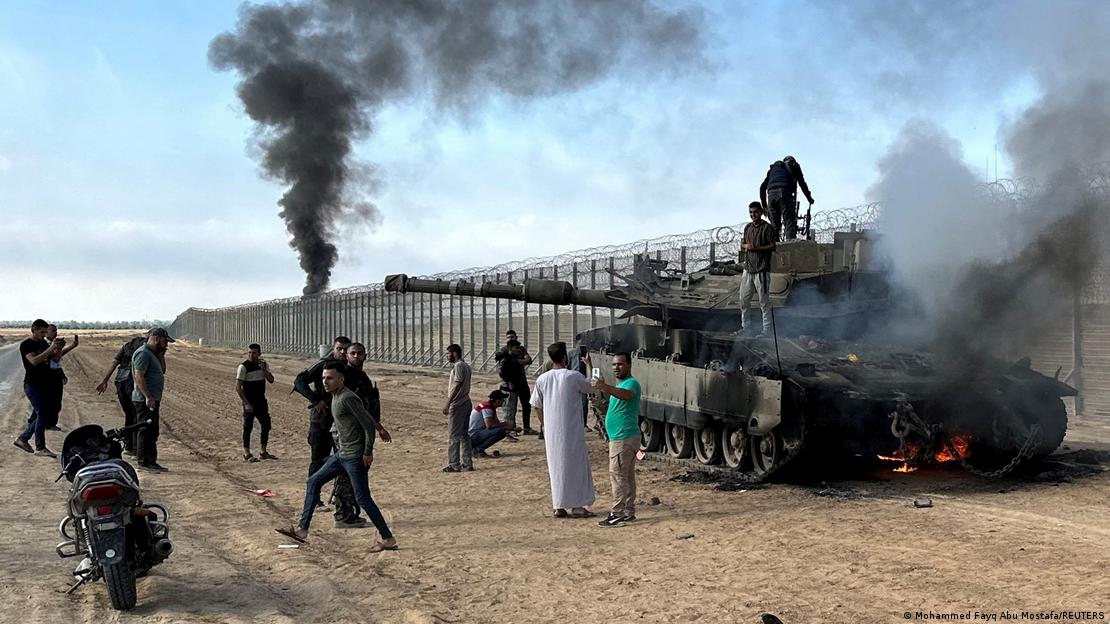Israel cuts off electricity, water, food and fuel to enclave of 2 million Palestinians. “We fight animals and we will act accordingly,” says Israeli Defense Minister. Pressure grows for ground invasion.
Israeli Defense Minister Yoav Gallant announced on Monday (09/10) a “total siege” of the Gaza Strip, the overcrowded Palestinian enclave from where the Hamas terrorists who massacred hundreds of Israeli civilians last Saturday departed. According to Gallant, Israel will suspend the supply of water, electricity, food and fuel to Gaza, home to around 2 million Palestinians, which has been suffering from a severe economic and traffic blockade for 15 years.
“I have ordered a total siege of Gaza. We are fighting animals and we will act accordingly,” said Gallant. On Sunday, while visiting one of the Israeli towns attacked by Hamas, the minister had already warned that “the price the Gaza Strip will pay will be very heavy”.
On Sunday, Israel’s Security Cabinet formally declared a state of war, which, according to the government, will allow for “comprehensive military measures”.
On Monday, Hamas continued to attack Israeli territory from the air. Rockets launched by the group hit cities such as Jerusalem and Tel Aviv. One rocket exploded near Ben Gurion International Airport.
Pressure for ground invasion
The Gaza Strip, which is tightly controlled by the Islamic fundamentalist group Hamas, has already been the target of heavy Israeli air strikes since Saturday. According to local health authorities, more than 500 Palestinians have already been killed in these air strikes.
At the moment, pressure is growing among sectors of the Israeli government for a ground invasion of the Gaza Strip. Israel called up 300,000 reservists after Saturday’s attacks. Tanks were deployed in the vicinity of the Palestinian enclave.
Over the weekend, Israel’s Prime Minister Benjamin Netanyahu, who promised to “avenge” the weekend massacres, warned Palestinians to leave areas of Gaza where Hamas operates. But with Gaza isolated and under siege, residents say they have nowhere to run.
As of Monday morning, 123,000 had left their homes in the Gaza Strip, according to the United Nations Office for the Coordination of Humanitarian Affairs. Of these, around 73,000 sought shelter in 64 schools.
The last Israeli operation in Gaza that included a ground invasion took place in 2014, and left more than 2,000 dead in the strip, most of them civilians, according to the United Nations. Since then, Israel has preferred to carry out only aerial operations against Hamas, also as a way of limiting potential casualties of Israeli ground troops. But after Saturday’s massacre, different Israeli political and military sectors began to press for more drastic measures against Hamas.
“Anything less than an invasion will be a grave mistake. We need to conquer Gaza, or at least most of it, and destroy Hamas. We can’t keep doing the same things we did before and which aren’t working,” said Amir Avivi, former deputy commander of the Gaza Division of Israel’s armed forces.
Israeli troops occupied Gaza for almost four decades between the 1960s and 2000s. In 2005, Israel unilaterally withdrew from the enclave. However, shortly afterwards, the area fell under the complete control of Hamas, which expelled moderate Palestinian politicians and imposed a fundamentalist regime, while also carrying out regular attacks on Israel. Since 2007, Israel and Egypt – which also opposes Hamas – have imposed a severe economic and circulation blockade on the enclave, which has become even more impoverished during this period.
However, Hamas’ seizure of dozens of Israeli hostages, including women and the elderly, who were taken through Gaza, should complicate potential ground invasion plans. A spokesman for the Izz ad-Din al-Qassam Brigades, the armed branch of Hamas, said on Monday that Israel’s bombardment of the Gaza Strip has already killed four Israeli hostages.
A new ground invasion also raises fears of another bloodbath. Gaza is one of the most densely populated areas on the planet, with around 2 million inhabitants.

“Israel’s “9/11 and Pearl Harbor
On Monday, the Israeli government reported that it had regained control of sites in the south of the country that were invaded by Hamas terrorists on Saturday. However, Israeli soldiers and terrorists were still exchanging fire in the town of Kfar Azza.
Israel is still counting its dead from the attack, which included the firing of rockets and the infiltration of armed men from more than two dozen points on the border with Gaza. Inside Israel, the terrorists attacked military installations and began to systematically massacre the population, even going house to house to murder residents.
According to the latest figures, more than 700 people, most of them civilians, have been killed in Hamas’ surprise offensive, which includes attacks by sea, land and air. On Sunday, 260 bodies were found at the site of a music festival taking place near the border with Gaza, which was attacked by armed men. The US has confirmed that nine Americans. There are also three Brazilians missing.
The attack is already one of the most serious events in Israeli history. The last comparable major episode, the bloody Second Intifada in the early 2000s, killed more than a thousand Israelis, but over the course of four years of open conflict with the Palestinians. In the 1973 Yom Kippur War, more than 2,500 Israeli soldiers died in two weeks of conflict with Syria and Egypt. The hundreds of Israeli deaths in the Hamas attack were recorded in just one day.
As well as murdering hundreds, including children, Hamas also kidnapped dozens in Israel, including foreign citizens, and took them to Gaza. Many were kidnapped from the music festival that was the target of the attack, but military personnel and police officers were also reportedly taken.
Earlier on Monday, Lieutenant Colonel Jonathan Conricus, spokesman for the Israel Defense Forces, described Saturday’s events as devastating. “This is by far the worst day in Israel’s history. Never before have so many Israelis been killed by a single thing in a single day.”
He also said that the day could be compared to a combination of “9/11 and Pearl Harbor”, in reference to the attacks suffered by the US in 2001 and the Japanese surprise attack on the Pearl Harbor base in 1941, which marked the American entry into the Second World War.
Criticism of the Israeli intelligence service
These two historic episodes also highlighted profound intelligence failures in the US. In Israel, the attack also highlighted similar failures by the country’s intelligence and information sectors, considered until then to be among the best in the world, which failed to detect Hamas’ comprehensive and daring offensive beforehand.
“It’s a big failure,” said Yaakov Amidror, former national security adviser to Prime Minister Benjamin Netanyahu. “This operation actually proves that the [intelligence] capabilities in Gaza were not good.” Amidror avoided speculating on the causes of the failure, saying that lessons should be learned when the dust settles.
Rear Admiral Daniel Hagari, one of Israel’s main military spokesmen, acknowledged that the Armed Forces owed the public an explanation, but now was not the time. “First we fight, then we investigate,” he said.
“No national intelligence agency is omniscient or perfect, but this is a colossal failure,” Bruce Hoffman, a counterterrorism researcher, told the American network NPR.
Over the past decade, Hamas has largely attacked Israel with rockets. As a result, the Israeli forces around Gaza were not prepared for a ground attack, Hoffman says. “They weren’t ready for battle. I think there was a complacency that everything was quiet on the Gaza border.”
Some analysts, however, point out that it is too early to attribute the blame solely to an intelligence failure, citing that a significant part of military resources were being deployed in the West Bank, leaving the border with Gaza less protected.
Before the attack, Israel was also facing a delicate political moment, due to the measures taken by Netanyahu’s ultra-right-wing government to weaken the judiciary, which caused fissures in the cohesion of the Armed Forces, with many military personnel showing dissatisfaction with the plans.
